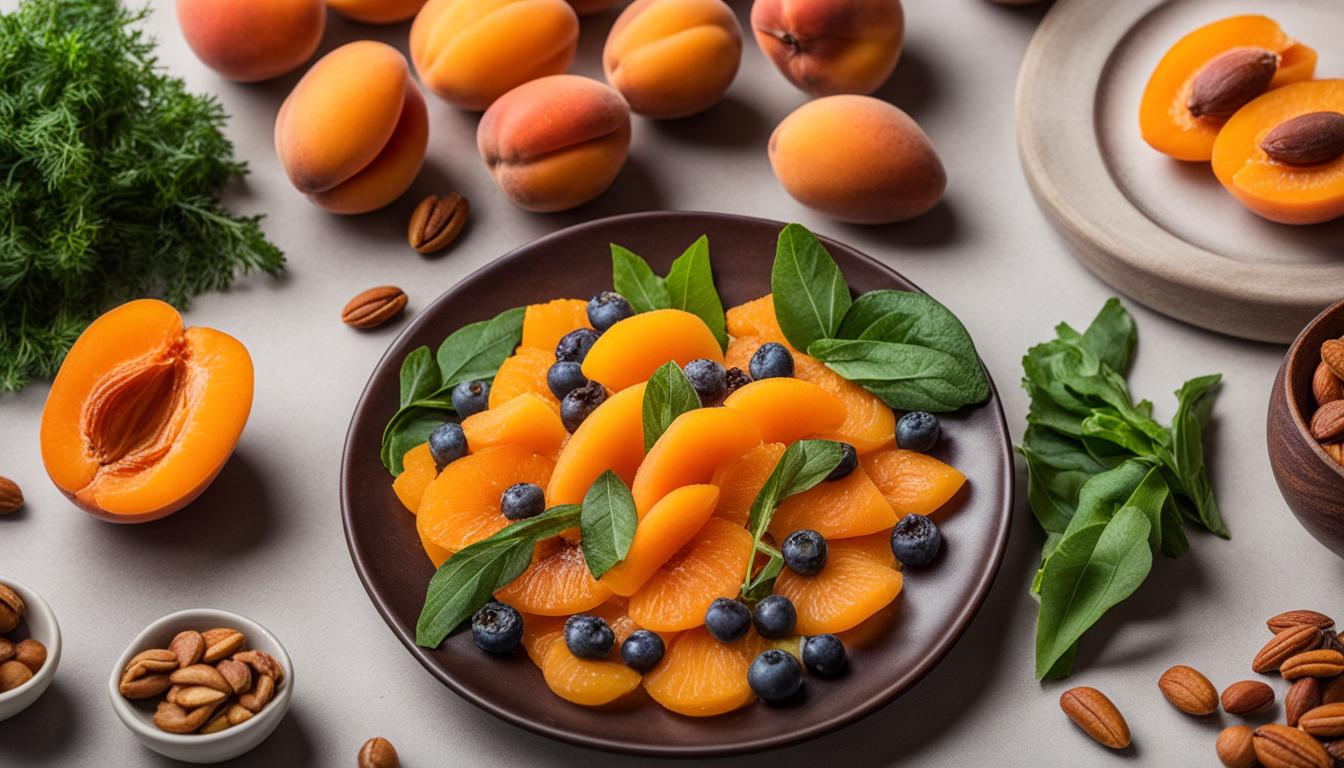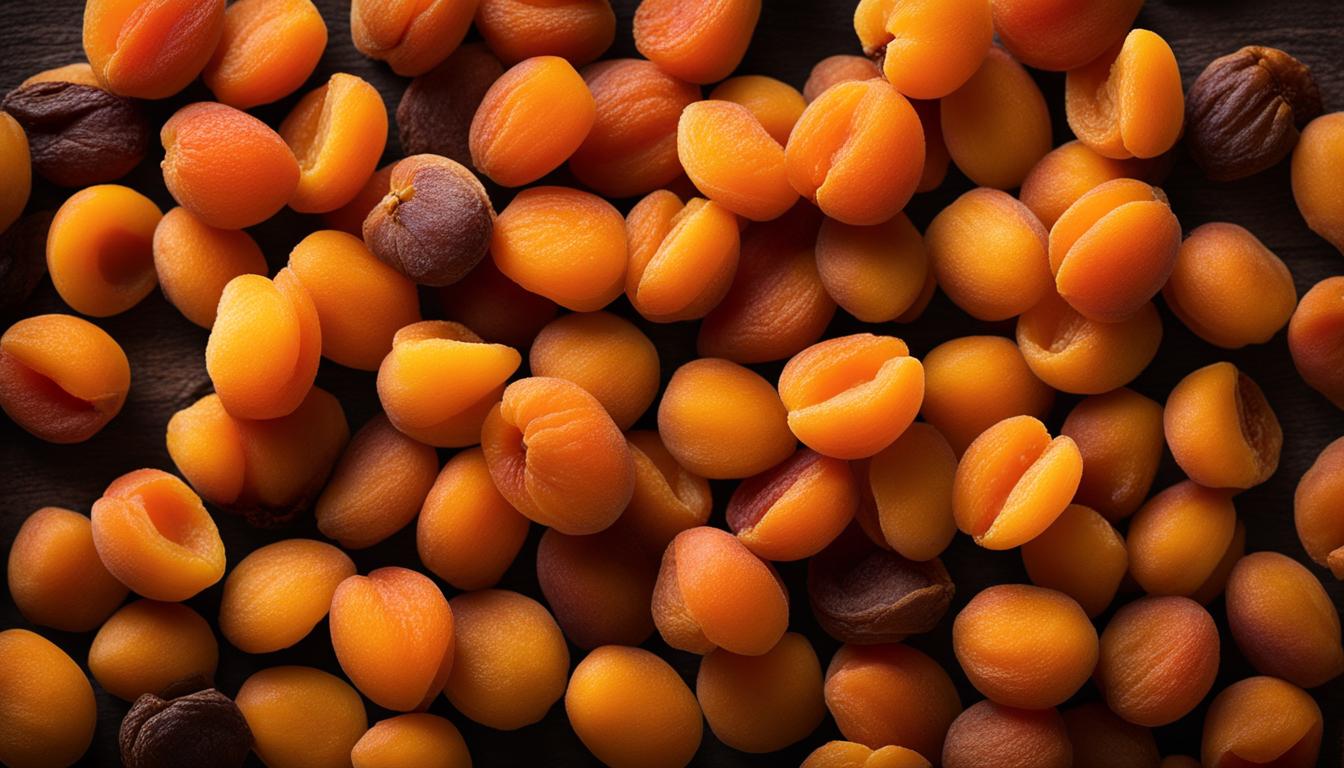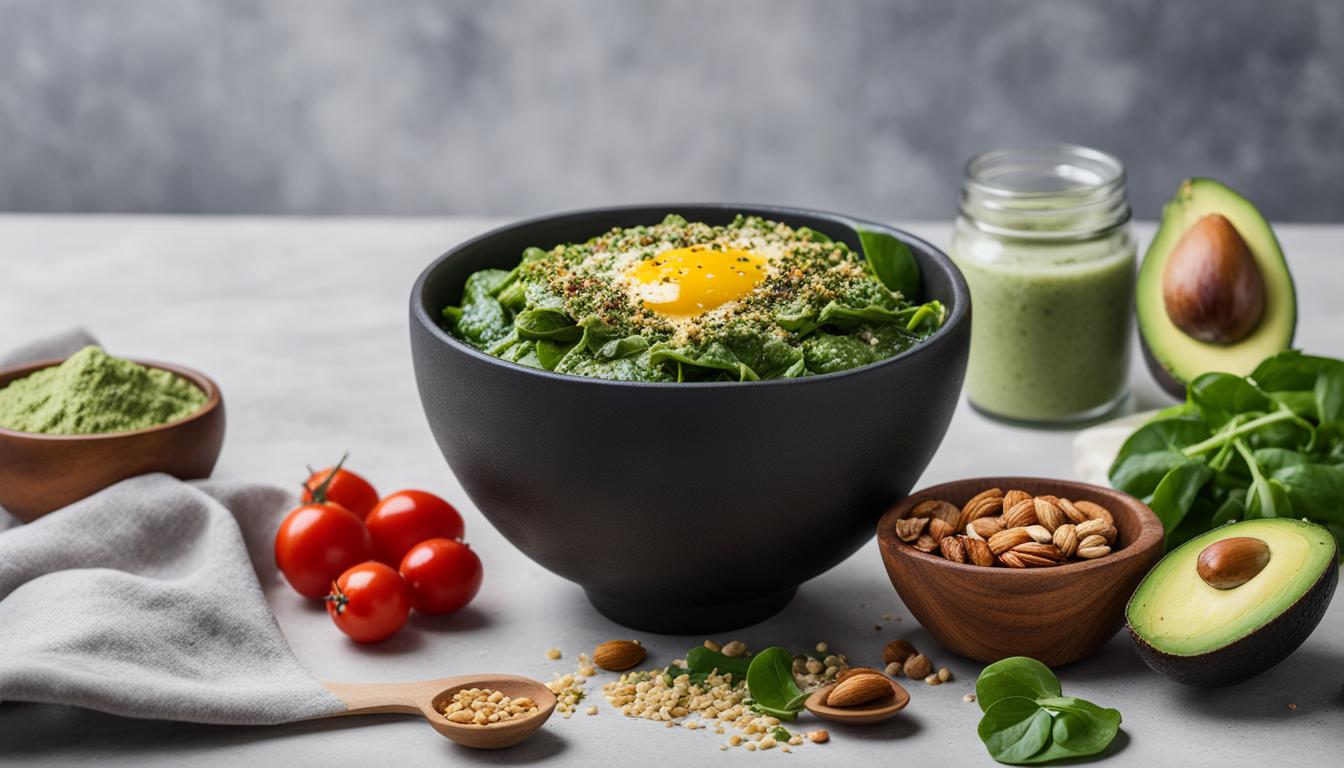Apricots are a popular fruit, but if you follow a strict keto diet, you may wonder if they are keto-friendly. In terms of net carbs, apricots do contain carbs, but they can still be enjoyed in moderation on a keto diet. Let’s explore the net carb content of apricots and how they can fit into a keto lifestyle.
Key Takeaways:
- Apricots can be enjoyed in small portions on a keto diet.
- They have a moderate net carb content.
- Apricots offer health benefits and are rich in vitamin C.
- Portion control is key when incorporating apricots into a ketogenic meal plan.
- There are other low carb fruit options that are more suitable for a strict keto diet.
Net Carb Content of Apricots
When it comes to low carb fruits, apricots are a popular choice for those following a keto or low carb diet. While they do contain some carbs, their net carb content is moderate, which means they can still be enjoyed in small portions as part of a keto-friendly meal plan.
One medium-sized apricot contains about 3.2 grams of net carbs, while 100 grams of apricots contain around 9.1 grams of net carbs. This makes them suitable for a low carb or ketogenic diet, where the goal is to limit carbohydrate intake to promote ketosis, a metabolic state where the body burns fat for fuel instead of carbs.
Choosing low carb fruits like apricots can help you maintain a low carb diet and stay within your desired carb range. They provide a sweet and refreshing option, without significantly impacting your daily carbohydrate intake.
Apricot Net Carb Content:
| Apricot Size | Net Carb Content |
|---|---|
| Medium-sized apricot | 3.2 grams |
| 100 grams of apricots | 9.1 grams |
As you can see, even though apricots do contain carbs, their net carb content is relatively low compared to other fruits. So, you can enjoy the natural sweetness of apricots while still maintaining a low carb or ketogenic lifestyle.
Remember, when incorporating apricots or any other fruit into your low carb or keto meal plan, it’s important to practice portion control and consider your overall carbohydrate intake for the day. By being mindful of your carb intake and choosing low carb fruits, you can continue to enjoy a variety of fruits while following a low carb or keto diet.
Nutritional Benefits of Apricots
Apricots offer several health benefits and are a good source of essential vitamins. They are particularly rich in vitamin C, which is important for immune function and collagen production. Apricots also contain other vitamins and minerals, including vitamin A, vitamin E, and beta carotene. Additionally, apricots are low in calories and can provide a refreshing and nutritious option for those following a low carb or keto diet.
Incorporating apricots into your diet can contribute to overall health and well-being. Here are the key nutritional benefits of apricots:
- Rich in Vitamin C: Apricots are an excellent source of vitamin C, which is vital for a healthy immune system. Vitamin C also helps in collagen production, promoting healthy skin.
- Source of Essential Vitamins: Apricots contain vitamin A, vitamin E, and beta carotene. Vitamin A supports healthy vision, vitamin E acts as an antioxidant, protecting the body against oxidative damage, and beta carotene is essential for overall health and well-being.
- Low in Calories: Apricots are low in calories, making them a great choice for those aiming to manage their weight.
Apricots can be enjoyed in various ways, enhancing the taste and nutritional profile of your meals. Whether eaten fresh, cooked, or dried, they offer a delicious and convenient way to incorporate essential vitamins and minerals into your diet.
“Apricots are a rich source of vitamin C, essential for a healthy immune system and collagen production.”
– Health Expert
Nutritional Profile of Apricots
| Nutrient | Amount per 100g |
|---|---|
| Calories | 48 |
| Carbohydrates | 11g |
| Fiber | 2g |
| Vitamin C | 10mg |
| Vitamin A | 1926IU |
| Vitamin E | 0.89mg |
| Beta Carotene | 811mcg |
Incorporating Apricots into a Keto Diet
While apricots do contain carbs, you can still incorporate them into a keto diet with careful portion control. To maintain ketosis and stay on track with your ketogenic lifestyle, consider these tips:
- Mindful Portion Control: When including apricots in your diet, be mindful of your daily carb limit and adjust your meal plan accordingly. Stick to small portions to manage your carb intake.
- Choose Keto-Friendly Alternatives: It’s essential to choose keto-friendly alternatives whenever possible. Instead of relying solely on apricots, incorporate other keto fruits that have lower net carb content, such as berries, avocados, or olives, into your meal plan.
- Monitor Your Overall Carb Intake: In addition to considering the carb content of apricots, it’s crucial to be aware of the carb content of other foods you consume throughout the day. This will help you stay within your desired carb range and maintain ketosis.
By following these strategies, you can enjoy the flavors of apricots while still adhering to a keto diet. Remember, the key to success is maintaining a balance between your carb intake and high-fat consumption.

Keep in mind that every individual’s body may respond differently to various foods. Listen to your body and make adjustments accordingly to ensure optimal results.
Other Low Carb Fruit Options
If you’re looking to add more variety to your low carb fruit options, berries tend to be a popular choice among those following a ketogenic diet. Berries such as strawberries, raspberries, and blackberries are not only delicious but also relatively low in net carbs, making them a great addition to your keto-friendly meal plan.
Berries are rich in antioxidants, vitamins, and fiber, which can support your overall health while aligning with your low carb goals. They are also known for their natural sweetness, satisfying your cravings for something sweet without compromising your dietary restrictions.
Strawberries, for example, contain just 5 grams of net carbs per 100 grams, while raspberries have only 6 grams of net carbs per 100 grams. Blackberries are also a good option, with around 5 grams of net carbs per 100 grams. These low carb fruits can provide a burst of flavor while still supporting your body’s ability to burn fat.
Including a variety of fruits and vegetables in your diet is important to ensure you’re getting a range of essential vitamins, minerals, and antioxidants. Berries, along with other low carb fruit options like avocados and olives, can help you meet your nutritional needs while following a ketogenic lifestyle.
Remember, portion control is still key when it comes to incorporating these fruits into your diet. While they are low in net carbs, consuming them in excessive amounts may still affect your ketosis. Aim for small portions and enjoy them in moderation as part of a well-rounded, keto-friendly meal plan.
Keto-Friendly Fruit Options:
- Strawberries (5 grams of net carbs per 100 grams)
- Raspberries (6 grams of net carbs per 100 grams)
- Blackberries (5 grams of net carbs per 100 grams)
- Avocados (2 grams of net carbs per 100 grams)
- Olives (3 grams of net carbs per 100 grams)
By incorporating these low carb fruits into your ketogenic diet, you can enjoy a variety of flavors and still stay on track with your carb goals. Experiment with different recipes, such as adding berries to your salads, blending them into smoothies, or enjoying them as a topping for your low carb desserts.
Apricots: Fresh vs. Dried
When it comes to apricots, it’s important to consider the difference in carb content between fresh and dried varieties. The carb content can vary significantly depending on how these fruits are prepared.
Fresh apricots have a lower carb content compared to dried apricots. Consuming fresh apricots is generally a better option if you are following a keto diet or trying to keep your carbohydrate intake in check.
For example, one cup of fresh apricots contains about 48.9 grams of net carbs, while the same amount of dried apricots can have up to 63 grams of net carbs.

If you’re following a keto diet, it’s best to opt for fresh apricots or consume dried apricots in smaller portions to stay within your carb limits. Remember that portion control is key when incorporating dried apricots into your meal plan.
Comparing Carb Content: Fresh Apricots vs. Dried Apricots
| Total Carbohydrates (per 1 cup) | |
|---|---|
| Fresh Apricots | 48.9 grams |
| Dried Apricots | 63 grams |
As seen in the table above, dried apricots contain a higher carb content compared to fresh apricots. Therefore, it’s important to be mindful of your portion sizes when consuming dried apricots on a keto or low-carb diet.
Opt for Fresh Apricots for Lower Carb Intake
If you’re looking to minimize your carbohydrate intake, fresh apricots are a better choice compared to dried ones. They provide the delicious flavor and nutritional benefits of apricots while containing fewer net carbs.
Keep in mind that the specific carb content can vary based on the exact size and ripeness of the apricots, so it’s important to check nutrition labels or consult a reliable source for the most accurate information.
Apricots in Moderation for Keto-Friendly Meal Plans
While apricots can be enjoyed in moderation on a keto diet, it’s important to be mindful of your overall carb intake. Some individuals may find that consuming apricots or other fruits can affect their blood glucose levels or slow down their weight loss progress.
If you’re closely monitoring your net carbohydrate consumption or have specific weight loss goals, it may be best to limit or avoid apricots altogether. Remember, everyone’s body is different, so it’s essential to listen to your body’s response and adjust your meal plan accordingly.
Impact on Blood Glucose Levels
Apricots, like other fruits, contain natural sugars that can increase blood glucose levels when consumed. For individuals with diabetes or those following a strict ketogenic diet, this increase in blood sugar may hinder their ability to maintain ketosis and achieve a state of fat burning.
Although apricots have a lower glycemic index compared to higher sugar fruits like watermelon, it’s still important to be cautious and monitor your body’s response when incorporating them into your keto meal plan.
Consideration for Weight Loss
If your primary goal is weight loss, closely monitoring your net carbohydrate intake is crucial. While apricots are a healthier alternative to processed sweets and snacks, their carbohydrate content can still add up.
If you’re aiming to achieve a calorie deficit and maximize fat loss, it may be beneficial to prioritize foods with lower net carbohydrates. While apricots offer essential vitamins and minerals, opting for lower carb options like berries can be more conducive to your weight loss journey.
Listening to Your Body
The key to a successful keto meal plan is finding what works best for your body. Some individuals may be able to enjoy apricots in moderation without any negative impact on their ketosis or weight loss progress.
However, if you notice that consuming apricots adversely affects your blood glucose levels or stalls your weight loss, it’s important to listen to your body’s signals and make appropriate adjustments to your diet.
Remember, every individual is unique, and what works for one person may not work for another. It’s essential to find a balance that supports your health, weight loss goals, and overall well-being.
Apricots and Overall Health
While apricots do contain carbs, they can still be part of a healthy diet when consumed in moderation. Apricots offer important nutrients that support overall health, including heart health. They are low in saturated fat and sodium, making them a heart-healthy option. In addition, apricots are a good source of dietary fiber, which can support digestive health. When incorporating apricots into your meal plan, be mindful of their net carb content and adjust your portion sizes accordingly.
Exploring Keto-Friendly Fruit Options
If you’re following a keto diet, it’s essential to explore a variety of keto-friendly fruit options. While apricots can be enjoyed in moderation, there are other fruits that are even lower in net carbs, making them more suitable for a strict ketogenic lifestyle. Some examples of keto-friendly fruits include avocados, berries, and olives. These fruits are lower in net carbs and can still provide essential vitamins and minerals, such as vitamin E, which is important for nerve and muscle function.
To give you a better understanding of the net carb content of these fruits, here’s a comparison:
| Fruit | Net Carbs per 100g |
|---|---|
| Avocado | 2g |
| Strawberries | 5.5g |
| Raspberries | 5.4g |
| Blackberries | 4.9g |
| Olives | 0.2g |
These fruits can be incorporated into your keto meal plan in various ways. Avocado can be added to salads or enjoyed as a spread, while berries can be eaten as a snack or added to keto-friendly desserts. Olives make a great addition to salads or can be enjoyed as a flavorful snack on their own.
By including these keto-friendly fruits in your diet, you can satisfy your sweet cravings while still maintaining ketosis and reaping the benefits of a ketogenic lifestyle.
img src=”https://seowriting.ai/32_6.png” alt=”keto-friendly fruits” />
Conclusion
In conclusion, apricots can be a delicious addition to a keto diet when consumed in moderation. While they do contain a moderate amount of net carbs, practicing portion control is key to ensure they fit within your desired carb range. Remember that a keto diet is high in healthy fats and low in carbohydrates, so be sure to incorporate plenty of nutritious, high-fat foods into your meals for overall health.
When enjoying apricots, it’s important to also include a variety of other low carb fruits and vegetables in your diet. This will ensure you’re receiving a range of essential vitamins, minerals, and fiber that are important for optimal eye health and overall well-being.
By making mindful choices and consuming fruits like apricots in small portions, you can still reap the benefits of their vitamins and enjoy their natural sweetness while maintaining a keto lifestyle. Remember, moderation and balance are key when it comes to incorporating any fruit into your diet, and apricots can be a tasty and nutritious addition to your keto meal plan.
FAQ
Are apricots keto friendly?
Apricots can be enjoyed in moderation on a keto diet due to their moderate net carb content.
How many net carbs do apricots contain?
One medium-sized apricot contains about 3.2 grams of net carbs, while 100 grams of apricots contain around 9.1 grams of net carbs.
What are the nutritional benefits of apricots?
Apricots are rich in vitamin C, vitamin A, vitamin E, and beta carotene, making them a good source of essential vitamins.
How can I incorporate apricots into a keto diet?
You can incorporate apricots into a keto diet by practicing portion control and choosing keto-friendly alternatives whenever possible.
What are some other low carb fruit options?
Berries, such as strawberries, raspberries, and blackberries, are popular choices for those following a ketogenic diet due to their low net carb content.
Are fresh or dried apricots better for keto diets?
Fresh apricots have a lower carb content compared to dried apricots, so they are generally a better option for keto diets.
Can apricots affect blood glucose levels or weight loss progress?
Some individuals may find that consuming apricots or other fruits can affect their blood glucose levels or slow down their weight loss progress.
Do apricots have any benefits for heart health?
Apricots are low in saturated fat and sodium, making them a heart-healthy option. They also contain dietary fiber, which supports digestive health.
What other fruits are keto-friendly?
Avocados, berries, and olives are examples of keto-friendly fruits that are lower in net carbs and rich in essential vitamins and minerals.


